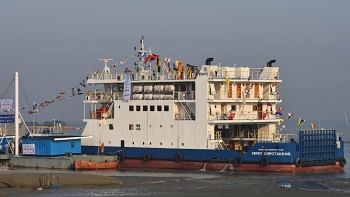Death for Rajshahi war criminal
The International Crimes Tribunal-1 yesterday found a Rajshahi man guilty of crimes against humanity committed during the 1971 Liberation War and handed down death penalty to him.
Convict Abdus Sattar alias Tipu Sultan (66), a member of Razakar Bahini in Boalia area of Rajshahi, had directly taken part in crimes, including abduction, torture and killing of freedom fighters, during the war.
“The accused has been found to have participated in conducting the attacks with extreme barbaric attitude, knowing the consequence and goal,” the tribunal said, adding, “We did not find that the convicted accused expressed remorse of any degree...”
Sattar was also a member of Islami Chhatra Sangha, the then student wing of anti-liberation Jamaat-e-Islami, during the war, according to the prosecution.
He was arrested in May, 1972 under the collaborators order but was released in August, 1974. Sattar was not arrested in relation to any charge brought against him in this case.
He passed BA (honours) in 1979 and MA in 1980 from Rajshahi University. The accused retired in 2011 as an assistant professor from Gopalpur Degree College in Natore’s Lalpur.
The three-member tribunal led by its Chairman Justice Md Shahinur Islam and members Justice Amir Hossain and Justice Md Abu Ahmed Jamadar read out the summary of the 177-page judgement in presence of Sattar, his family members, prosecution, defence, investigators and journalists.
“The offences as crimes against humanity shocked the human conscience, precisely on account of their extreme and intrinsic gravity. The horrendous offences committed by the accused therefore gravely aggrieved all human beings, we conclude,” reads the judgement.
Thus, these must be punished through appropriate sentence, in exercise of judicial discretion, it added.
Through the verdict, Prosecutor Mukhlesur Rahman Badal said both the prosecution and victim family members got justice.
Gazi MH Tamim, state-appointed defence counsel, however, said his client will challenge it with the Supreme Court.
According to the International Crimes (Tribunals) Act, 1973, a war crimes convict can file an appeal with the SC within 30 days from the date the verdict is declared.
The tribunals have so far delivered 41 verdicts against 95 people. Of them, 69 have been sentenced to death. None had been acquitted till now.
CHARGES AND CONVICTION
Sattar was handed down death penalty for taking part in abduction of one Babar Mandal, who was brutally tortured at Pakistan occupation army’s torture camp set up at Shaheed Shamsuzzoha Hall of Rajshahi University. Mandal was shot dead on September 27, 1971.
The tribunal gave Sattar capital punishment for his direct participation in abducting, torturing and killing nine non-combatant freedom fighters.
According to the charges, Sattar along with the Pakistani army and Razakars attacked Talaimari village under Boalia Police Station and detained freedom fighters from their homes.
They were taken to the army camp at the hall and tortured. The nine were killed on November 4, 1971, it added.
SCOPE FOR EXTENSIVE PROBE
The tribunal said Pakistan occupation army did not just station at Shamsuzzoha Hall in 1971, they transformed it into a “concentration camp”, and had recurrently killed countless civilians after bringing them there.
“Targeting civilians would not have been possible without active assistance, contribution and collaboration of Bangalee traitors belonging to Razakar Bahini and pro-Pakistan political parties,” it said.
The tribunal said they got a portrayal of the army camp set up at the hall from an article titled, “Honouring a Rare Sacrifice”, published in The Daily Star on March 31, 2011.
“Around mid-April, a huge force of the Pakistani army entered the city. Most of the campus residents left the area as the Pakistani army established their base at the university halls. The army turned Shaheed Shamsuzzoha Hall into a ‘concentration camp’ and ‘repression centre’. After torturing them, the barbarians killed the students, the intellectuals and able-bodied males at the mass graveyard behind Zoha Hall,” the verdict mentioned, citing the report of the English daily.
“We fail to comprehend why the investigation agency did not care to concentrate on other countless events, which resulted in killing of thousands of civilians, after keeping them confined to the army camp…,” it added.
The tribunal said more extensive investigation can help comprehend what extent of barbaric atrocities were carried out at the army camp at Zoha Hall during the Liberation War.

 For all latest news, follow The Daily Star's Google News channel.
For all latest news, follow The Daily Star's Google News channel. 



Comments